Commercial Law (BULAW1503) Assignment: Corporation Law Analysis Report
VerifiedAdded on 2023/01/17
|9
|2525
|32
Report
AI Summary
This report presents a comprehensive analysis of corporation law, focusing on key concepts such as agency relationships and fiduciary duties. The first part of the report examines a case study involving Rugger Advance Pty Ltd and its sales agent, Rick Nixx, exploring issues of breach of duty and the remedies available to the principal. The analysis incorporates relevant case law, including Panorama Developments (Guildford) v Fidelis Furnishing Fabrics Ltd and Hewson V Sydney Stock Exchange, to illustrate the legal principles governing agency. The second part of the report delves into the Royal Commission into Misconduct in the Banking, Superannuation and Financial Services Industry, specifically examining its impact on the insurance sector and its observations regarding misconduct, imbalances in knowledge, and the interests of insurers and the insured. The report emphasizes the importance of ethical conduct and compliance within the financial services industry, providing a detailed overview of the legal and regulatory landscape.
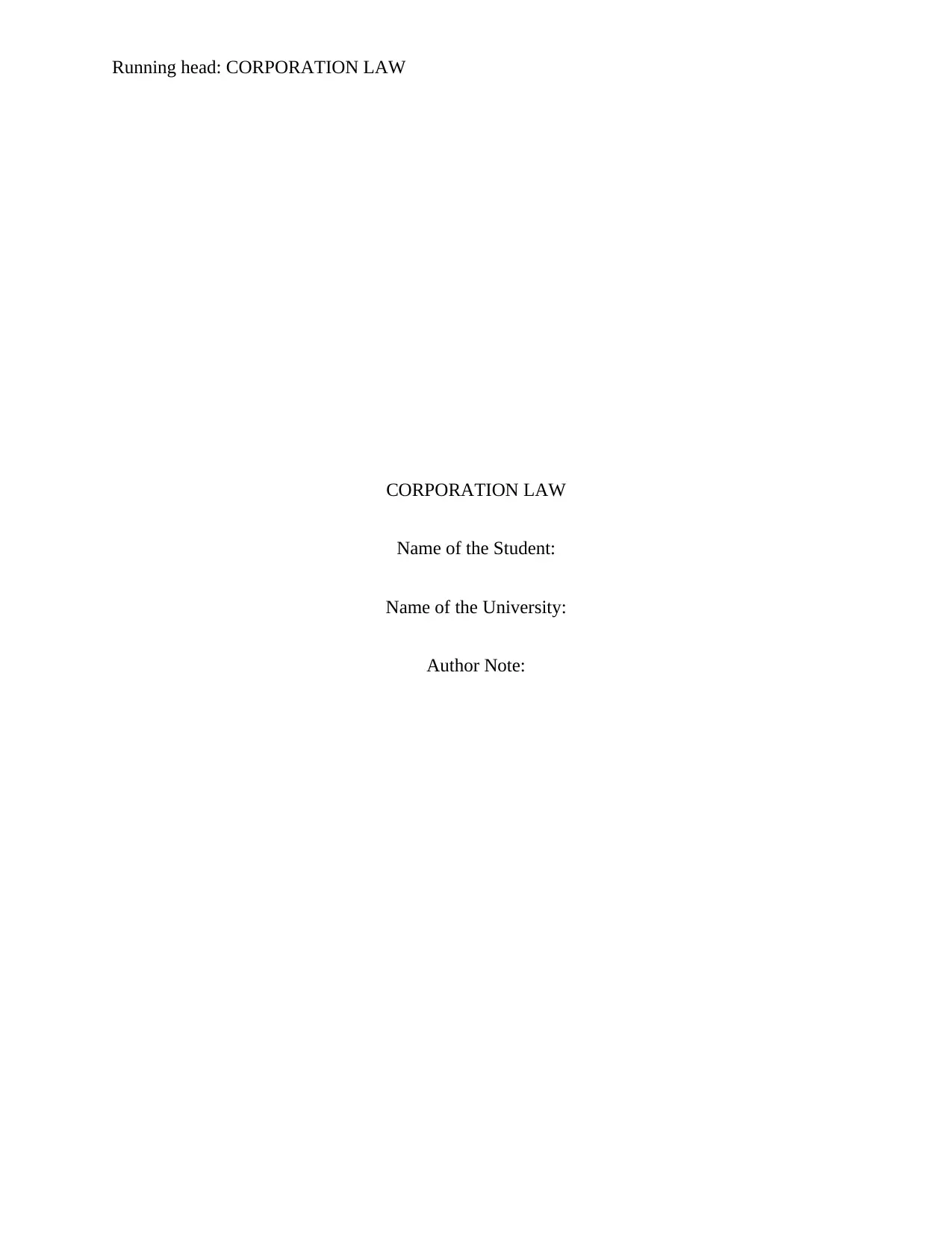
Running head: CORPORATION LAW
CORPORATION LAW
Name of the Student:
Name of the University:
Author Note:
CORPORATION LAW
Name of the Student:
Name of the University:
Author Note:
Paraphrase This Document
Need a fresh take? Get an instant paraphrase of this document with our AI Paraphraser
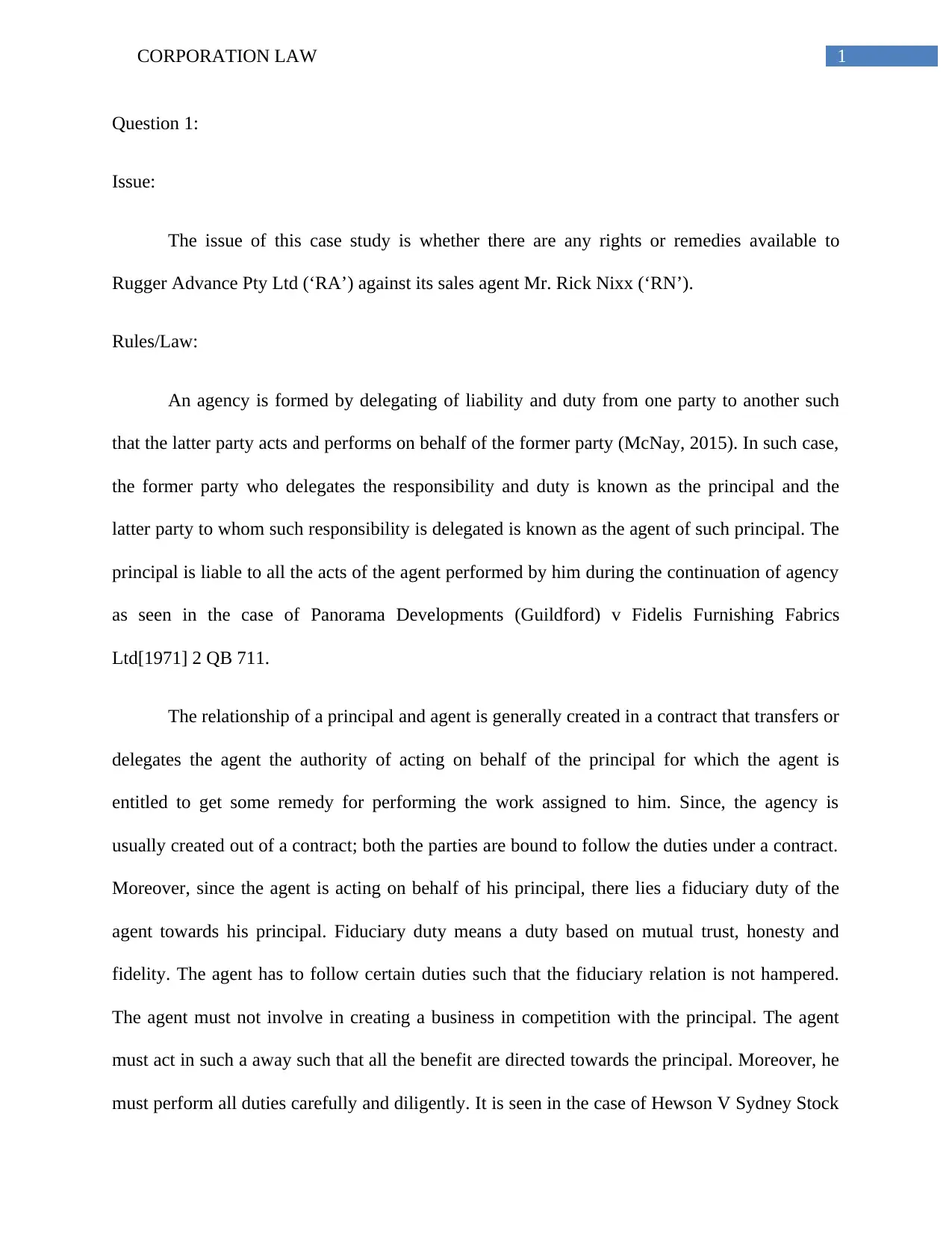
1CORPORATION LAW
Question 1:
Issue:
The issue of this case study is whether there are any rights or remedies available to
Rugger Advance Pty Ltd (‘RA’) against its sales agent Mr. Rick Nixx (‘RN’).
Rules/Law:
An agency is formed by delegating of liability and duty from one party to another such
that the latter party acts and performs on behalf of the former party (McNay, 2015). In such case,
the former party who delegates the responsibility and duty is known as the principal and the
latter party to whom such responsibility is delegated is known as the agent of such principal. The
principal is liable to all the acts of the agent performed by him during the continuation of agency
as seen in the case of Panorama Developments (Guildford) v Fidelis Furnishing Fabrics
Ltd[1971] 2 QB 711.
The relationship of a principal and agent is generally created in a contract that transfers or
delegates the agent the authority of acting on behalf of the principal for which the agent is
entitled to get some remedy for performing the work assigned to him. Since, the agency is
usually created out of a contract; both the parties are bound to follow the duties under a contract.
Moreover, since the agent is acting on behalf of his principal, there lies a fiduciary duty of the
agent towards his principal. Fiduciary duty means a duty based on mutual trust, honesty and
fidelity. The agent has to follow certain duties such that the fiduciary relation is not hampered.
The agent must not involve in creating a business in competition with the principal. The agent
must act in such a away such that all the benefit are directed towards the principal. Moreover, he
must perform all duties carefully and diligently. It is seen in the case of Hewson V Sydney Stock
Question 1:
Issue:
The issue of this case study is whether there are any rights or remedies available to
Rugger Advance Pty Ltd (‘RA’) against its sales agent Mr. Rick Nixx (‘RN’).
Rules/Law:
An agency is formed by delegating of liability and duty from one party to another such
that the latter party acts and performs on behalf of the former party (McNay, 2015). In such case,
the former party who delegates the responsibility and duty is known as the principal and the
latter party to whom such responsibility is delegated is known as the agent of such principal. The
principal is liable to all the acts of the agent performed by him during the continuation of agency
as seen in the case of Panorama Developments (Guildford) v Fidelis Furnishing Fabrics
Ltd[1971] 2 QB 711.
The relationship of a principal and agent is generally created in a contract that transfers or
delegates the agent the authority of acting on behalf of the principal for which the agent is
entitled to get some remedy for performing the work assigned to him. Since, the agency is
usually created out of a contract; both the parties are bound to follow the duties under a contract.
Moreover, since the agent is acting on behalf of his principal, there lies a fiduciary duty of the
agent towards his principal. Fiduciary duty means a duty based on mutual trust, honesty and
fidelity. The agent has to follow certain duties such that the fiduciary relation is not hampered.
The agent must not involve in creating a business in competition with the principal. The agent
must act in such a away such that all the benefit are directed towards the principal. Moreover, he
must perform all duties carefully and diligently. It is seen in the case of Hewson V Sydney Stock
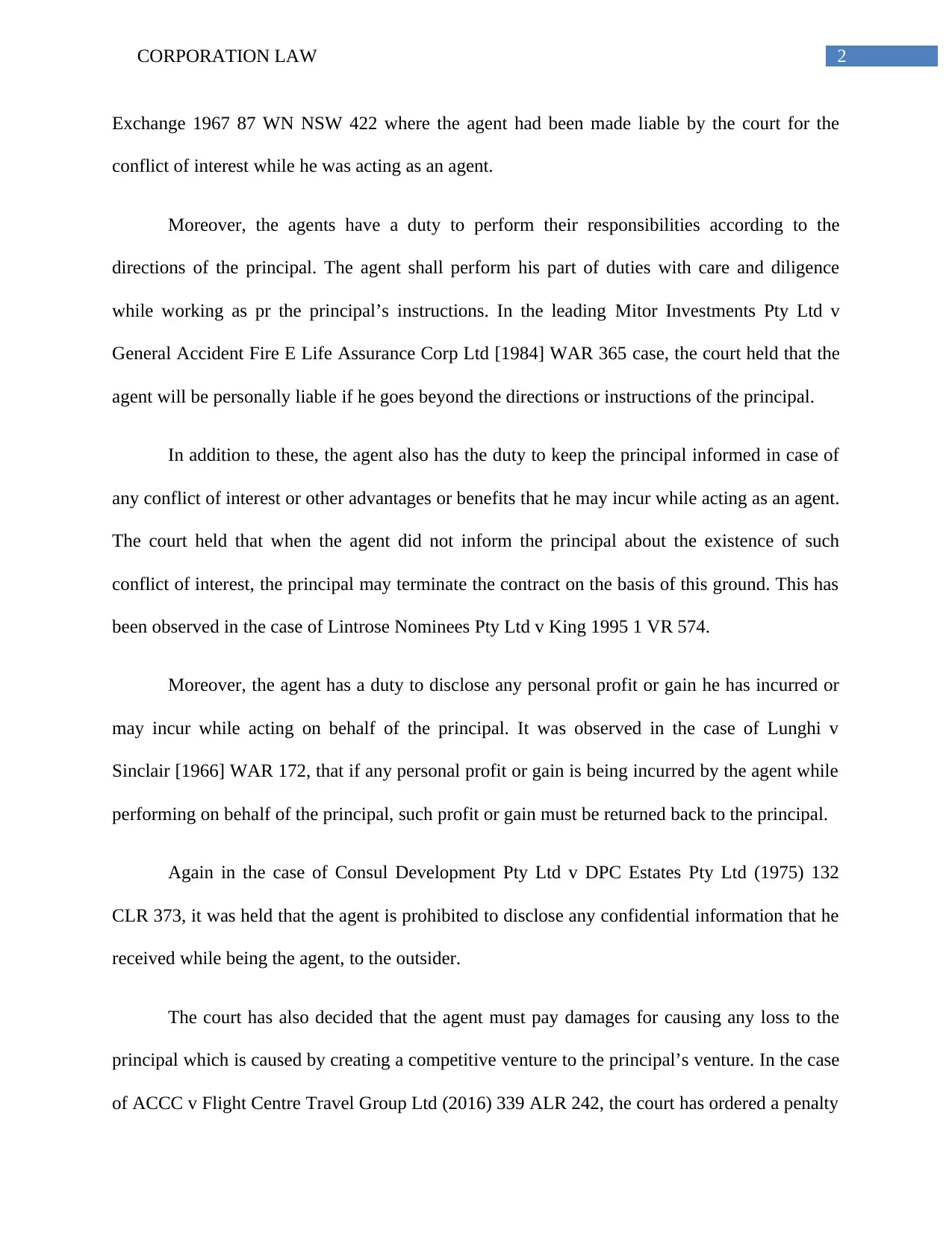
2CORPORATION LAW
Exchange 1967 87 WN NSW 422 where the agent had been made liable by the court for the
conflict of interest while he was acting as an agent.
Moreover, the agents have a duty to perform their responsibilities according to the
directions of the principal. The agent shall perform his part of duties with care and diligence
while working as pr the principal’s instructions. In the leading Mitor Investments Pty Ltd v
General Accident Fire E Life Assurance Corp Ltd [1984] WAR 365 case, the court held that the
agent will be personally liable if he goes beyond the directions or instructions of the principal.
In addition to these, the agent also has the duty to keep the principal informed in case of
any conflict of interest or other advantages or benefits that he may incur while acting as an agent.
The court held that when the agent did not inform the principal about the existence of such
conflict of interest, the principal may terminate the contract on the basis of this ground. This has
been observed in the case of Lintrose Nominees Pty Ltd v King 1995 1 VR 574.
Moreover, the agent has a duty to disclose any personal profit or gain he has incurred or
may incur while acting on behalf of the principal. It was observed in the case of Lunghi v
Sinclair [1966] WAR 172, that if any personal profit or gain is being incurred by the agent while
performing on behalf of the principal, such profit or gain must be returned back to the principal.
Again in the case of Consul Development Pty Ltd v DPC Estates Pty Ltd (1975) 132
CLR 373, it was held that the agent is prohibited to disclose any confidential information that he
received while being the agent, to the outsider.
The court has also decided that the agent must pay damages for causing any loss to the
principal which is caused by creating a competitive venture to the principal’s venture. In the case
of ACCC v Flight Centre Travel Group Ltd (2016) 339 ALR 242, the court has ordered a penalty
Exchange 1967 87 WN NSW 422 where the agent had been made liable by the court for the
conflict of interest while he was acting as an agent.
Moreover, the agents have a duty to perform their responsibilities according to the
directions of the principal. The agent shall perform his part of duties with care and diligence
while working as pr the principal’s instructions. In the leading Mitor Investments Pty Ltd v
General Accident Fire E Life Assurance Corp Ltd [1984] WAR 365 case, the court held that the
agent will be personally liable if he goes beyond the directions or instructions of the principal.
In addition to these, the agent also has the duty to keep the principal informed in case of
any conflict of interest or other advantages or benefits that he may incur while acting as an agent.
The court held that when the agent did not inform the principal about the existence of such
conflict of interest, the principal may terminate the contract on the basis of this ground. This has
been observed in the case of Lintrose Nominees Pty Ltd v King 1995 1 VR 574.
Moreover, the agent has a duty to disclose any personal profit or gain he has incurred or
may incur while acting on behalf of the principal. It was observed in the case of Lunghi v
Sinclair [1966] WAR 172, that if any personal profit or gain is being incurred by the agent while
performing on behalf of the principal, such profit or gain must be returned back to the principal.
Again in the case of Consul Development Pty Ltd v DPC Estates Pty Ltd (1975) 132
CLR 373, it was held that the agent is prohibited to disclose any confidential information that he
received while being the agent, to the outsider.
The court has also decided that the agent must pay damages for causing any loss to the
principal which is caused by creating a competitive venture to the principal’s venture. In the case
of ACCC v Flight Centre Travel Group Ltd (2016) 339 ALR 242, the court has ordered a penalty
⊘ This is a preview!⊘
Do you want full access?
Subscribe today to unlock all pages.

Trusted by 1+ million students worldwide

3CORPORATION LAW
of 12.5 million $ to the principal to be paid by the agent for creating a venture in competition
with the principal.
Application:
In the present case study, it is seen that the Rugger Advance Pty Ltd (‘RA’) is a large
proprietary limited company, with its head office and operations facility at Berwick. It is a
leading manufacturer and supplier of assorted rugby union and rugby league merchandise and
equipment. Mr Rick Nixx (‘RN’) is its one and only sales agent for the SA in the Northern
Territory (‘NT’). This can be regarded as a relation of agency between RA and RN. It is so as
there is delegation of authority given to RN by the RA for acting on its behalf. Here RA can be
termed as the principal and RN as the agent of RA. Thus RN is bound to all the liabilities and
duties of an agent towards it principal as enumerated in the case of Panorama Developments
(Guildford) v Fidelis Furnishing Fabrics Ltd [1971] 2 QB 711.
The agency between RA and RN is being created out of a contract that entitles RN with
the duty of conducting and managing the sales in the Northern Territory on the behalf of RA in
lieu of benefits to be given by RA to RT. Thus RN has a duty to perform certain duties and carry
out transactions on behalf of RA. Thus RN is bound by certain duties toward RA as per the
contract law. In addition to this, as the agent RN is being working on behalf of RA, there lie
some fiduciary duties between them. The agent has a fiduciary duty to work diligently and
carefully, for the benefit of its principal, not incurring personal gain and not creating any
business in completion of the principal. Moreover there must not be any conflict of interest
between them and if it is there, the agent must inform this to the principal, then principal then has
of 12.5 million $ to the principal to be paid by the agent for creating a venture in competition
with the principal.
Application:
In the present case study, it is seen that the Rugger Advance Pty Ltd (‘RA’) is a large
proprietary limited company, with its head office and operations facility at Berwick. It is a
leading manufacturer and supplier of assorted rugby union and rugby league merchandise and
equipment. Mr Rick Nixx (‘RN’) is its one and only sales agent for the SA in the Northern
Territory (‘NT’). This can be regarded as a relation of agency between RA and RN. It is so as
there is delegation of authority given to RN by the RA for acting on its behalf. Here RA can be
termed as the principal and RN as the agent of RA. Thus RN is bound to all the liabilities and
duties of an agent towards it principal as enumerated in the case of Panorama Developments
(Guildford) v Fidelis Furnishing Fabrics Ltd [1971] 2 QB 711.
The agency between RA and RN is being created out of a contract that entitles RN with
the duty of conducting and managing the sales in the Northern Territory on the behalf of RA in
lieu of benefits to be given by RA to RT. Thus RN has a duty to perform certain duties and carry
out transactions on behalf of RA. Thus RN is bound by certain duties toward RA as per the
contract law. In addition to this, as the agent RN is being working on behalf of RA, there lie
some fiduciary duties between them. The agent has a fiduciary duty to work diligently and
carefully, for the benefit of its principal, not incurring personal gain and not creating any
business in completion of the principal. Moreover there must not be any conflict of interest
between them and if it is there, the agent must inform this to the principal, then principal then has
Paraphrase This Document
Need a fresh take? Get an instant paraphrase of this document with our AI Paraphraser
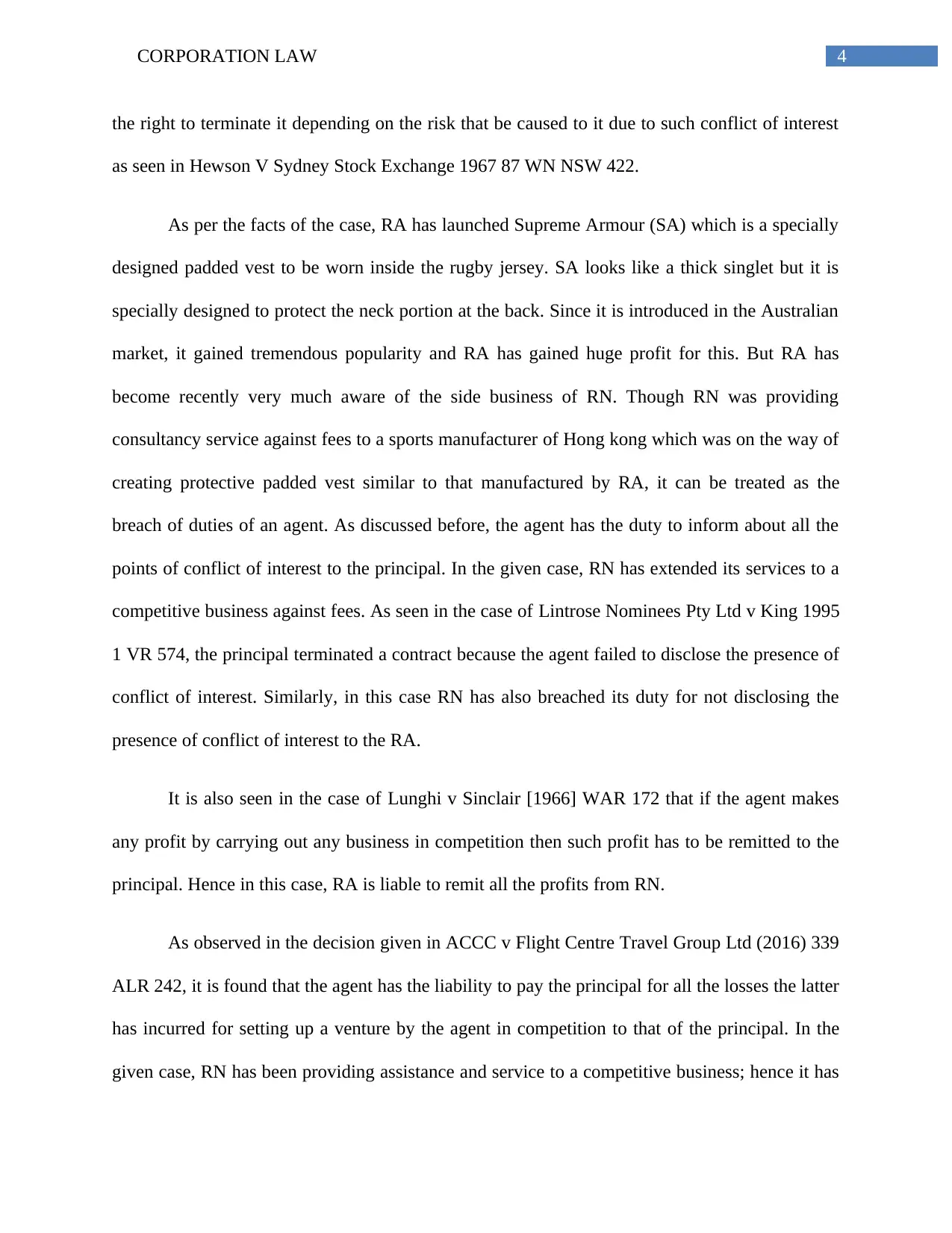
4CORPORATION LAW
the right to terminate it depending on the risk that be caused to it due to such conflict of interest
as seen in Hewson V Sydney Stock Exchange 1967 87 WN NSW 422.
As per the facts of the case, RA has launched Supreme Armour (SA) which is a specially
designed padded vest to be worn inside the rugby jersey. SA looks like a thick singlet but it is
specially designed to protect the neck portion at the back. Since it is introduced in the Australian
market, it gained tremendous popularity and RA has gained huge profit for this. But RA has
become recently very much aware of the side business of RN. Though RN was providing
consultancy service against fees to a sports manufacturer of Hong kong which was on the way of
creating protective padded vest similar to that manufactured by RA, it can be treated as the
breach of duties of an agent. As discussed before, the agent has the duty to inform about all the
points of conflict of interest to the principal. In the given case, RN has extended its services to a
competitive business against fees. As seen in the case of Lintrose Nominees Pty Ltd v King 1995
1 VR 574, the principal terminated a contract because the agent failed to disclose the presence of
conflict of interest. Similarly, in this case RN has also breached its duty for not disclosing the
presence of conflict of interest to the RA.
It is also seen in the case of Lunghi v Sinclair [1966] WAR 172 that if the agent makes
any profit by carrying out any business in competition then such profit has to be remitted to the
principal. Hence in this case, RA is liable to remit all the profits from RN.
As observed in the decision given in ACCC v Flight Centre Travel Group Ltd (2016) 339
ALR 242, it is found that the agent has the liability to pay the principal for all the losses the latter
has incurred for setting up a venture by the agent in competition to that of the principal. In the
given case, RN has been providing assistance and service to a competitive business; hence it has
the right to terminate it depending on the risk that be caused to it due to such conflict of interest
as seen in Hewson V Sydney Stock Exchange 1967 87 WN NSW 422.
As per the facts of the case, RA has launched Supreme Armour (SA) which is a specially
designed padded vest to be worn inside the rugby jersey. SA looks like a thick singlet but it is
specially designed to protect the neck portion at the back. Since it is introduced in the Australian
market, it gained tremendous popularity and RA has gained huge profit for this. But RA has
become recently very much aware of the side business of RN. Though RN was providing
consultancy service against fees to a sports manufacturer of Hong kong which was on the way of
creating protective padded vest similar to that manufactured by RA, it can be treated as the
breach of duties of an agent. As discussed before, the agent has the duty to inform about all the
points of conflict of interest to the principal. In the given case, RN has extended its services to a
competitive business against fees. As seen in the case of Lintrose Nominees Pty Ltd v King 1995
1 VR 574, the principal terminated a contract because the agent failed to disclose the presence of
conflict of interest. Similarly, in this case RN has also breached its duty for not disclosing the
presence of conflict of interest to the RA.
It is also seen in the case of Lunghi v Sinclair [1966] WAR 172 that if the agent makes
any profit by carrying out any business in competition then such profit has to be remitted to the
principal. Hence in this case, RA is liable to remit all the profits from RN.
As observed in the decision given in ACCC v Flight Centre Travel Group Ltd (2016) 339
ALR 242, it is found that the agent has the liability to pay the principal for all the losses the latter
has incurred for setting up a venture by the agent in competition to that of the principal. In the
given case, RN has been providing assistance and service to a competitive business; hence it has
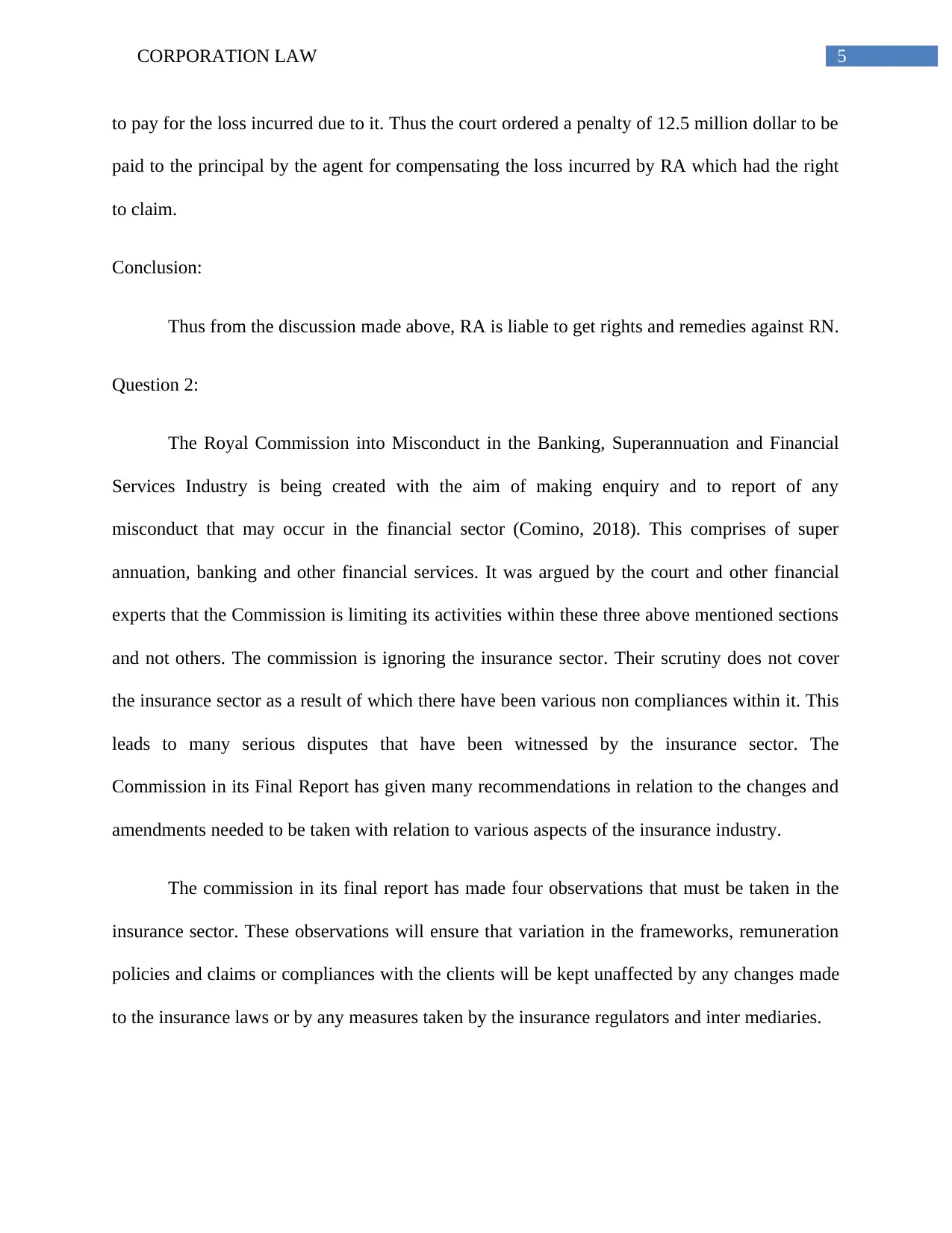
5CORPORATION LAW
to pay for the loss incurred due to it. Thus the court ordered a penalty of 12.5 million dollar to be
paid to the principal by the agent for compensating the loss incurred by RA which had the right
to claim.
Conclusion:
Thus from the discussion made above, RA is liable to get rights and remedies against RN.
Question 2:
The Royal Commission into Misconduct in the Banking, Superannuation and Financial
Services Industry is being created with the aim of making enquiry and to report of any
misconduct that may occur in the financial sector (Comino, 2018). This comprises of super
annuation, banking and other financial services. It was argued by the court and other financial
experts that the Commission is limiting its activities within these three above mentioned sections
and not others. The commission is ignoring the insurance sector. Their scrutiny does not cover
the insurance sector as a result of which there have been various non compliances within it. This
leads to many serious disputes that have been witnessed by the insurance sector. The
Commission in its Final Report has given many recommendations in relation to the changes and
amendments needed to be taken with relation to various aspects of the insurance industry.
The commission in its final report has made four observations that must be taken in the
insurance sector. These observations will ensure that variation in the frameworks, remuneration
policies and claims or compliances with the clients will be kept unaffected by any changes made
to the insurance laws or by any measures taken by the insurance regulators and inter mediaries.
to pay for the loss incurred due to it. Thus the court ordered a penalty of 12.5 million dollar to be
paid to the principal by the agent for compensating the loss incurred by RA which had the right
to claim.
Conclusion:
Thus from the discussion made above, RA is liable to get rights and remedies against RN.
Question 2:
The Royal Commission into Misconduct in the Banking, Superannuation and Financial
Services Industry is being created with the aim of making enquiry and to report of any
misconduct that may occur in the financial sector (Comino, 2018). This comprises of super
annuation, banking and other financial services. It was argued by the court and other financial
experts that the Commission is limiting its activities within these three above mentioned sections
and not others. The commission is ignoring the insurance sector. Their scrutiny does not cover
the insurance sector as a result of which there have been various non compliances within it. This
leads to many serious disputes that have been witnessed by the insurance sector. The
Commission in its Final Report has given many recommendations in relation to the changes and
amendments needed to be taken with relation to various aspects of the insurance industry.
The commission in its final report has made four observations that must be taken in the
insurance sector. These observations will ensure that variation in the frameworks, remuneration
policies and claims or compliances with the clients will be kept unaffected by any changes made
to the insurance laws or by any measures taken by the insurance regulators and inter mediaries.
⊘ This is a preview!⊘
Do you want full access?
Subscribe today to unlock all pages.

Trusted by 1+ million students worldwide

6CORPORATION LAW
The first observation is that whatever approach or measure is being taken by the law or
amendment, it must not encourage any misconduct. All the concerns must ensure that their
activities and measures through their employees, agents, officers or any other participants in
relation to the insurance sector must not lead to any misconduct being caused. The companies
and industry connected to insurance field is needed to create and apply strict policies and must
provide penalties and reward in case of any misconduct.
The second observation as put forwarded by the Commission is the determination and
recognition of the existence of imbalances in relation to knowledge and power. This requires a
balance of understanding of knowledge between the insurer and the insured persons. The insurer
and its representatives working on his behalf are needed to be very alert and cautious in regard to
the imbalance that is present between the insured person and the insurer. This is important as
most of the insured persons do not have suitable knowledge and information about the terms and
conditions of the insurance policies. They usually do feel to read the details of those policies.
They only try to understand them when they need to claim anything out of it. This kind of
difference between the knowledge of the insurer and the inured persons creates a lot of disputes.
The legislators have tried several times to change the scenario by making laws and rules (Brody,
2018). However, it can be said that the insurer has the main duty to explain everything in details
to the persons intended to be insured before making them enter into any policies. But in the
opinion of the Commission, it will be difficult to apply this. The commission mentions the need
of the insurers to take the responsibility in good faith while they deal with the claims that has
arisen out of a dispute.
The Commission in its third observation has held that the interest of the insurer and the
insured must be analysed before making any conduct and must ensure that the interest of the
The first observation is that whatever approach or measure is being taken by the law or
amendment, it must not encourage any misconduct. All the concerns must ensure that their
activities and measures through their employees, agents, officers or any other participants in
relation to the insurance sector must not lead to any misconduct being caused. The companies
and industry connected to insurance field is needed to create and apply strict policies and must
provide penalties and reward in case of any misconduct.
The second observation as put forwarded by the Commission is the determination and
recognition of the existence of imbalances in relation to knowledge and power. This requires a
balance of understanding of knowledge between the insurer and the insured persons. The insurer
and its representatives working on his behalf are needed to be very alert and cautious in regard to
the imbalance that is present between the insured person and the insurer. This is important as
most of the insured persons do not have suitable knowledge and information about the terms and
conditions of the insurance policies. They usually do feel to read the details of those policies.
They only try to understand them when they need to claim anything out of it. This kind of
difference between the knowledge of the insurer and the inured persons creates a lot of disputes.
The legislators have tried several times to change the scenario by making laws and rules (Brody,
2018). However, it can be said that the insurer has the main duty to explain everything in details
to the persons intended to be insured before making them enter into any policies. But in the
opinion of the Commission, it will be difficult to apply this. The commission mentions the need
of the insurers to take the responsibility in good faith while they deal with the claims that has
arisen out of a dispute.
The Commission in its third observation has held that the interest of the insurer and the
insured must be analysed before making any conduct and must ensure that the interest of the
Paraphrase This Document
Need a fresh take? Get an instant paraphrase of this document with our AI Paraphraser

7CORPORATION LAW
insured persons before recommending any policy. This also needs the brokers to prevent from
taking personal interest at the cost of the insurers. All the members of the insurance sector must
act for the benefit and rights of the insured persons (Brody, 2018).
The fourth observation as put forwarded by the commission in its final report is the
expectation of identifying the misconducts at the earliest instance and punishing the defaulters
for the same.
Any changes or variations that have been made by the legislations in relation to the
insurance industry as recommended by the Commission are required to comply and follow all the
four major observations made by the royal commission in its final report such that proper
working of the insurance sector is ensured. Moreover, these will be a step forward to remove all
the disputes and anomalies that have been observed by this industry in the recent days.
insured persons before recommending any policy. This also needs the brokers to prevent from
taking personal interest at the cost of the insurers. All the members of the insurance sector must
act for the benefit and rights of the insured persons (Brody, 2018).
The fourth observation as put forwarded by the commission in its final report is the
expectation of identifying the misconducts at the earliest instance and punishing the defaulters
for the same.
Any changes or variations that have been made by the legislations in relation to the
insurance industry as recommended by the Commission are required to comply and follow all the
four major observations made by the royal commission in its final report such that proper
working of the insurance sector is ensured. Moreover, these will be a step forward to remove all
the disputes and anomalies that have been observed by this industry in the recent days.
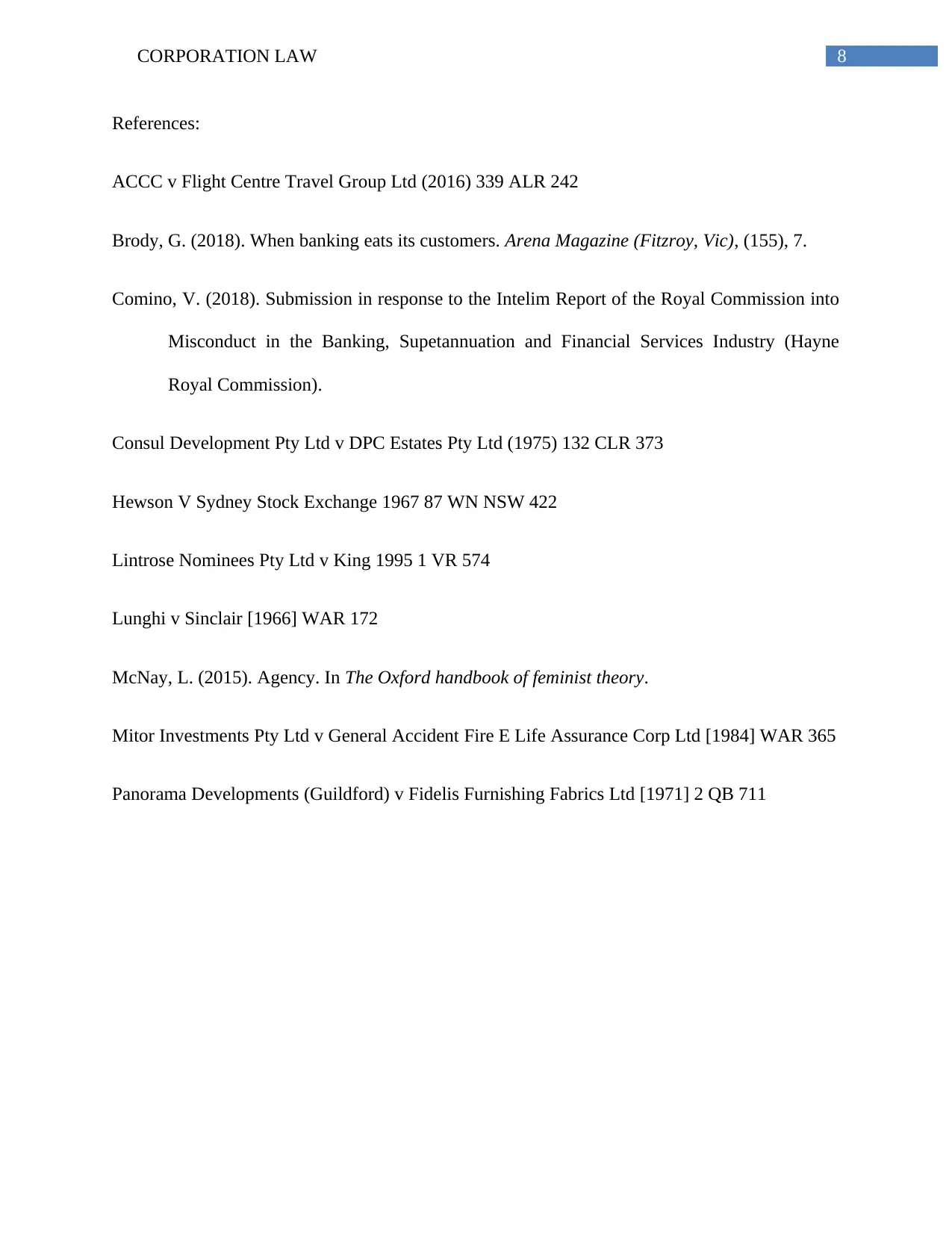
8CORPORATION LAW
References:
ACCC v Flight Centre Travel Group Ltd (2016) 339 ALR 242
Brody, G. (2018). When banking eats its customers. Arena Magazine (Fitzroy, Vic), (155), 7.
Comino, V. (2018). Submission in response to the Intelim Report of the Royal Commission into
Misconduct in the Banking, Supetannuation and Financial Services Industry (Hayne
Royal Commission).
Consul Development Pty Ltd v DPC Estates Pty Ltd (1975) 132 CLR 373
Hewson V Sydney Stock Exchange 1967 87 WN NSW 422
Lintrose Nominees Pty Ltd v King 1995 1 VR 574
Lunghi v Sinclair [1966] WAR 172
McNay, L. (2015). Agency. In The Oxford handbook of feminist theory.
Mitor Investments Pty Ltd v General Accident Fire E Life Assurance Corp Ltd [1984] WAR 365
Panorama Developments (Guildford) v Fidelis Furnishing Fabrics Ltd [1971] 2 QB 711
References:
ACCC v Flight Centre Travel Group Ltd (2016) 339 ALR 242
Brody, G. (2018). When banking eats its customers. Arena Magazine (Fitzroy, Vic), (155), 7.
Comino, V. (2018). Submission in response to the Intelim Report of the Royal Commission into
Misconduct in the Banking, Supetannuation and Financial Services Industry (Hayne
Royal Commission).
Consul Development Pty Ltd v DPC Estates Pty Ltd (1975) 132 CLR 373
Hewson V Sydney Stock Exchange 1967 87 WN NSW 422
Lintrose Nominees Pty Ltd v King 1995 1 VR 574
Lunghi v Sinclair [1966] WAR 172
McNay, L. (2015). Agency. In The Oxford handbook of feminist theory.
Mitor Investments Pty Ltd v General Accident Fire E Life Assurance Corp Ltd [1984] WAR 365
Panorama Developments (Guildford) v Fidelis Furnishing Fabrics Ltd [1971] 2 QB 711
⊘ This is a preview!⊘
Do you want full access?
Subscribe today to unlock all pages.

Trusted by 1+ million students worldwide
1 out of 9
Related Documents
Your All-in-One AI-Powered Toolkit for Academic Success.
+13062052269
info@desklib.com
Available 24*7 on WhatsApp / Email
![[object Object]](/_next/static/media/star-bottom.7253800d.svg)
Unlock your academic potential
Copyright © 2020–2026 A2Z Services. All Rights Reserved. Developed and managed by ZUCOL.





